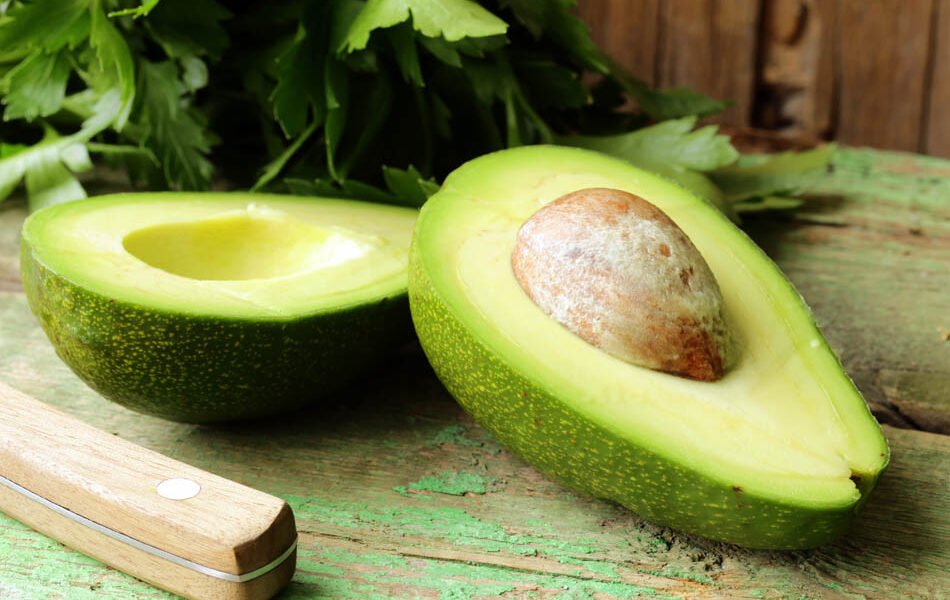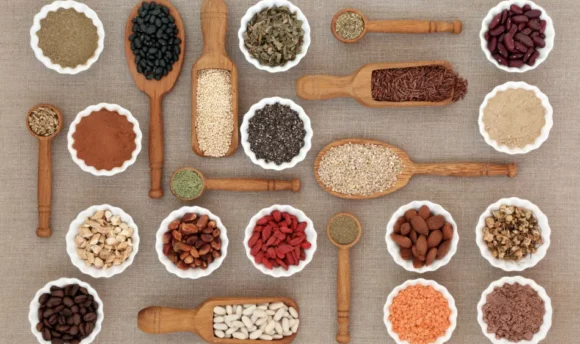Is Avocado Healthy? 10 Health Benefits and Nutrition Facts
Have you heard mixed messages about avocados that have left you unsure whether they’re healthy? We’re here to debunk many common avocado misconceptions.

Avocados, also known as butter fruit, are a food many people have mixed feelings about.
Although avocados are promoted as being healthy, they are also high in fat, and many people, especially those trying to lose weight, have started to avoid high-fat foods.
Just because something is fatty, though, that doesn’t make it bad.
In this article, we’ll educate readers on the benefits of unsaturated fats, which are found in avocados, and some of the other perks you can expect from eating this superfood.
Is Avocado Healthy?
Yes, avocado is healthy for you, and eating it daily is clinically proven to reduce your likelihood of heart disease.
This benefit is because of the high levels of monounsaturated fats found in avocado and other foods like nuts and even olive oil, which help lower levels of bad cholesterol.
10 Health Benefits of Avocados
Avocados are a superfood that provides benefits beyond just being nourishing for the body.
Much of the research on the benefits of avocado consumption has been conducted by the Hass avocado board, which could indicate a conflict of interest.
Still, many independent studies have also been conducted and support the following claims.
#1 Nutrient-rich
When you eat avocados, you are eating a food that contains a variety of vitamins and minerals, including vitamins B6 and C, potassium, vitamin E, and folate.
#2 Keeps bones strong
Avocados are high in vitamin K, an often overlooked vitamin that contributes to bone health, especially in people with osteoporosis.
Certain studies have shown that vitamin K supplementation can help improve bone health by increasing bone density and reducing fracture rates in people with porous or weak bones.
#3 Antimicrobial
A surprising benefit of upping your avocado intake is that it may make you more resistant to certain bacterial infections due to its antimicrobial properties.
There are even studies being done that use avocado products to treat antibiotic-resistant organisms, making them useful for disease prevention and treatment.
#4 Improves fat metabolism
Another benefit of eating avocados is that the high amount of monounsaturated fat they have can speed up your fat metabolism by putting your body in ketosis, prompting your body to use fat as a fuel source instead of carbohydrates.
Eating avocados as part of a ketogenic diet can not only improve your energy levels, but some studies have also demonstrated that eating a diet high in monounsaturated fat can actually prevent fat gain, even when not following a strict diet.
#5 Reduces symptoms of depression
Avocados are full of a vitamin called folate, also known as vitamin B9. The health benefits of folate include improved red blood cell formation and function, and evidence suggests that folate can help prevent the symptoms of depression.
One study which was conducted to find out the impact that folate has on mental health found that the group of participants suffering from depression had lower levels of folate than those without depression.
This research could prove that eating foods high in folate, like avocados, may improve the efficacy of traditional antidepressant medications.
#6 May prevent cancer
Avocados contain a variety of bioactive phytochemicals, which means that avocados have health benefits beyond just contributing to a healthy diet.
Among these phytochemicals are as many as 8 different substances that are believed to have anti-carcinogenic properties, meaning they can help prevent cancer or delay its development.
Although many of the studies that have taken place to figure out the effects of avocados on cancer haven’t been done on humans, there is still hope that the phytochemicals in avocados may prove useful in preventing cancer.
#7 Promotes heart health
Saturated fats are found in many foods, including butter, bacon, and sausages. While eating small amounts isn’t bad, too many saturated fats can raise cholesterol levels in the blood, increasing blood pressure and the likelihood of heart disease.
Avocados, high in unsaturated fats, can have health benefits for the heart, reducing cholesterol levels and cardiovascular disease risk.
#8 Improves gut health
When you eat even half an avocado, you eat close to 7 grams of fiber, 25% of your daily recommended amount.
Fiber is an often overlooked part of any healthy diet. It has health benefits like preventing constipation, promoting the growth of healthy bacteria, and even reducing the likelihood of colon cancer.
#9 Anti-inflammatory properties
Avocado is one of the best foods you can eat when it comes to minimizing the body’s inflammatory response. Inflammation can lead to several serious health issues, including abdominal and chest pain, arthritis, fatigue, and overall soreness and stiffness in the body.
Too much inflammation can also activate the body’s immune response, which, over time, can cause your body to begin attacking healthy cells.
Although healthy eating can help you limit the amount of inflammation in the body, even when treating yourself to something like a burger, adding avocado can help reduce the body’s inflammatory response.
#10 Can improve skin health
Avocado oil is used by many people who prefer to use more natural products on their skin. It can even be used by people suffering from breakouts and psoriasis because of its anti-inflammatory properties.
It is also full of fatty acids that can improve collagen production and reduce the impact of free radicals, helping prevent the effects of aging.
3 Side Effects of Avocados
Although you can expect to experience a wide range of benefits with avocados, they can have adverse effects as well.
It’s important to be aware of the side effects of avocado consumption before adding it to your diet.
#1 Can contribute to weight gain
Although eating foods full of healthy fat can have a positive effect on weight loss, that doesn’t negate the fact that avocados are high in calories.
Regardless of how healthy you eat, the only way to lose weight is by eating in a calorie deficit – meaning you eat fewer calories than you burn. It’s important to be aware that you are consuming close to 300 calories when you eat even one medium avocado.
#2 Allergic reaction
Avocado oil is commonly used on the skin and has been shown to improve skin health thanks to the fatty acids and variety of vitamins it contains. Still, it can cause severe reactions in people who are allergic.
To avoid negative reactions on your skin, do a patch test before using it on more sensitive parts of your body, like your face.
#3 Can prevent blood clotting
Avocados are high in vitamin K, which has been known to affect the effectiveness of certain blood thinners, like warfarin.
For anyone taking warfarin, keeping their vitamin K intake consistent is important to ensure their medication is working properly. Big spikes in vitamin K resulting from eating avocado or other green leafy vegetables are best to be avoided.
Nutrition Facts of Avocado
Knowing the nutritional value of what you put in your body is the best way to ensure you give yourself everything you need to maximize your energy and keep your body strong and healthy.
Nutritional value (per 100g/half an avocado)
| Calories/Nutrient (per 100g) | Amount |
| Calories (kcal) | 167 |
| Sodium (mg) | 8 |
| Net Carbs (g) | 1.84 |
| Fiber (g) | 6.8 |
| Sugar (g) | 0.3 |
| Fats (Total) | 15.4 |
| Protein (g) | 1.96 |
Source: https://fdc.nal.usda.gov/fdc-app.html#/food-details/171706/nutrients
High in calories and fats
Avocado is a high-calorie food that also contains an unusually high amount of fat in comparison to other fruits.
Foods high in calories and fat take a bad rap and are thought to contribute to adverse weight gain.
But the truth is, calorie-dense foods are necessary for maintaining high energy levels, and “healthy fats,” meaning monounsaturated fats, actually help lower our cholesterol and can be useful in weight maintenance.
Low in protein
Protein is necessary for building and maintaining muscle mass, and high-protein diets have even been proven to help with weight loss since foods with a lot of protein are helpful in satiating hunger.
Someone who is 165 pounds is recommended to eat 60 grams of protein per day. Since one avocado only has around 4 grams of protein, eating avocado with a high-protein food is necessary to hit the recommended daily requirement.
Moderate amount of carbohydrates
Carbohydrates are converted by our bodies into glycogen, which is subsequently converted into ATP, the most immediately accessible type of energy for our muscles.
Eating enough carbs is important, especially if you are trying to work out 6 days a week without getting tired, and since avocados aren’t especially high in carbs, you probably want to supplement with foods like quinoa or multigrain bread.
Rich in vitamins and minerals
Avocados are high in a number of fat-soluble vitamins and minerals, including:
- Folate (Vitamin B9): Used in creating healthy red blood cells and is involved in protein metabolism.
- Potassium: An important electrolyte responsible for healthy muscle function.
- Vitamin E: A powerful antioxidant that affects the health of your skin and eyes.
Healthy Avocado Recipe
Guacamole is a quick recipe you can make on the go to increase your daily avocado consumption. It contains only veggies, with avocado making up most of this tasty snack.
Ingredients
- 1 avocado
- 1 Roma tomato diced
- 1/4 cup diced red onion
- 1 tablespoon lemon or lime juice/half a lime squeezed
- 1 teaspoon Himalayan salt
- 1 teaspoon minced garlic (optional)
- 1 tablespoon fresh cilantro (optional)
Directions
Mash the avocado and then add diced tomato and onion. Afterward, mix in the lime juice and salt, with the option to add fresh minced garlic and cilantro.
You can eat the guacamole on its own, with tortilla chips, or even adding it as a topping to a sandwich on multigrain bread is a healthy choice.
Since avocados are high in healthy fats and important vitamins and minerals, making recipes that incorporate avocado is great for breaking fasts and replenishing your body between intermittent fasting sessions.
FAQs
A single avocado has close to 15 grams of fiber, which is close to half of the recommended daily dietary fiber (25–30 grams).
Avocados are good for you, and although they are high in fat, the fats contained in avocados are “healthy fats,” meaning they do not contribute to unhealthy cholesterol levels in the body.
Yes, eating avocados is associated with easier weight loss. This is because they’re high in fiber, which contributes to metabolic health and can also help with appetite suppression, allowing you to feel fuller for longer.
Avocado has a glycemic index of 15, meaning it will not spike blood sugar levels too quickly. This makes avocado a suitable food for people with diabetes.
A Word From Our Nutritionist
If you want to increase your avocado consumption but don’t like the taste or struggle to find time to cook, incorporating more avocado oil into your diet can help.
Avocado oil is abundant in oleic acid, a heart-healthy unsaturated fat, as well as vitamins A and E. Furthermore, it is an excellent substitute for seed oils, which are highly processed and refined oils with unknown long-term effects.
You may add extra avocado oil to your diet by using it as a cooking oil, mixing it with balsamic vinaigrette and using it on salads, or even taking a teaspoon if you don’t mind the flavor.
Bottom Line
Foods that are high in monounsaturated fat, like avocados, fish, and even olive oil, are an often overlooked part of a healthy diet.
Although avocado consumption can be related to a few negative side effects, overall, increasing the amount of avocado in your diet can help you manage your cholesterol levels, improve your metabolism, and help you reach your daily recommended amount of fiber.

















































 Select your language:
Select your language: 







